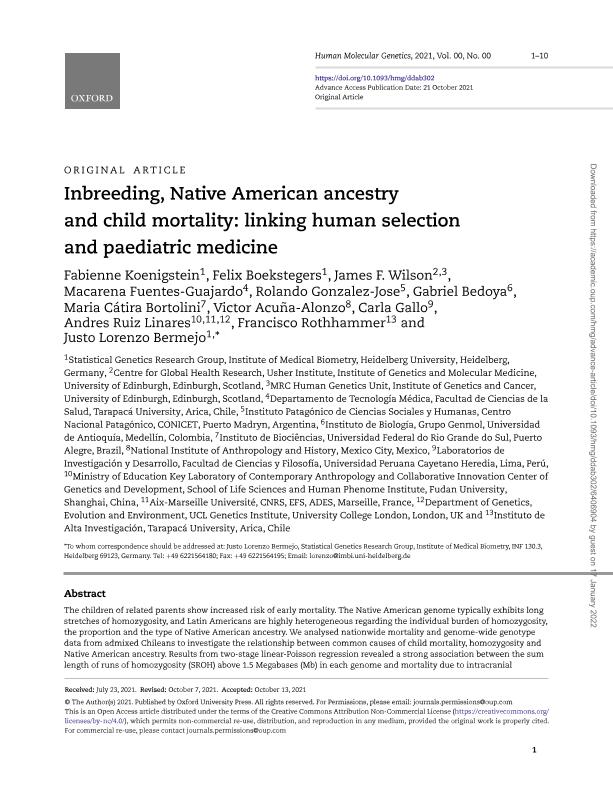Artículo
Inbreeding, Native American ancestry and child mortality: linking human selection and paediatric medicine
Koenigstein, Fabienne; Boekstegers, Felix; Wilson, James F.; Fuentes Guajardo, Macarena; Gonzalez-Jose, Rolando ; Bedoya Berrío, Gabriel; Bortolini, Maria Cátira; Acuña Alonzo, Victor; Gallo, Carla; Ruiz-Linares, Andres; Rothhammer, Francisco; Lorenzo Bermejo, Justo
; Bedoya Berrío, Gabriel; Bortolini, Maria Cátira; Acuña Alonzo, Victor; Gallo, Carla; Ruiz-Linares, Andres; Rothhammer, Francisco; Lorenzo Bermejo, Justo
 ; Bedoya Berrío, Gabriel; Bortolini, Maria Cátira; Acuña Alonzo, Victor; Gallo, Carla; Ruiz-Linares, Andres; Rothhammer, Francisco; Lorenzo Bermejo, Justo
; Bedoya Berrío, Gabriel; Bortolini, Maria Cátira; Acuña Alonzo, Victor; Gallo, Carla; Ruiz-Linares, Andres; Rothhammer, Francisco; Lorenzo Bermejo, Justo
Fecha de publicación:
10/2021
Editorial:
Oxford University Press
Revista:
Human Molecular Genetics
ISSN:
0964-6906
e-ISSN:
1460-2083
Idioma:
Inglés
Tipo de recurso:
Artículo publicado
Clasificación temática:
Resumen
The children of related parents show increased risk of early mortality. The Native American genome typically exhibits long stretches of homozygosity, and Latin Americans are highly heterogeneous regarding the individual burden of homozygosity, the proportion and the type of Native American ancestry. We analysed nationwide mortality and genome-wide genotype data from admixed Chileans to investigate the relationship between common causes of child mortality, homozygosity and Native American ancestry. Results from two-stage linear-Poisson regression revealed a strong association between the sum length of runs of homozygosity (SROH) above 1.5 Megabases (Mb) in each genome and mortality due to intracranial non-traumatic haemorrhage of foetus and newborn (5% increased risk of death per Mb in SROH, P = 1 × 10−3) and disorders related to short gestation and low birth weight (P = 3 × 10−4). The major indigenous populations in Chile are Aymara–Quechua in the north of the country and the Mapuche–Huilliche in the south. The individual proportion of Aymara–Quechua ancestry was associated with an increased risk of death due to anencephaly and similar malformations (P = 4 × 10−5), and the risk of death due to Edwards and Patau trisomy syndromes decreased 4% per 1% Aymara–Quechua ancestry proportion (P = 4 × 10−4) and 5% per 1% Mapuche–Huilliche ancestry proportion (P = 2 × 10−3). The present results suggest that short gestation, low birth weight and intracranial non-traumatic haemorrhage mediate the negative effect of inbreeding on human selection. Independent validation of the identified associations between common causes of child death, homozygosity and fine-scale ancestry proportions may inform paediatric medicine.
Palabras clave:
INBREEDING
,
GENOMICA
,
POBLACIONES MESTIZAS
,
LATINOAMERICA
Archivos asociados
Licencia
Identificadores
Colecciones
Articulos(IPCSH)
Articulos de INSTITUTO PATAGONICO DE CIENCIAS SOCIALES Y HUMANAS
Articulos de INSTITUTO PATAGONICO DE CIENCIAS SOCIALES Y HUMANAS
Articulos(SEDE CENTRAL)
Articulos de SEDE CENTRAL
Articulos de SEDE CENTRAL
Citación
Koenigstein, Fabienne; Boekstegers, Felix; Wilson, James F.; Fuentes Guajardo, Macarena; Gonzalez-Jose, Rolando; et al.; Inbreeding, Native American ancestry and child mortality: linking human selection and paediatric medicine; Oxford University Press; Human Molecular Genetics; 2021; 10-2021; 1-10
Compartir
Altmétricas



